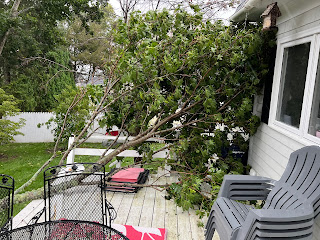Post-Tropical Cyclone Lee leaves nearly 100,000 Northern New Englanders in the dark
By Jennifer Costa, Regional Communications Director
Hurricane Lee became Post-Tropical Cyclone Lee Saturday as it made landfall in Canada. Here in the U.S., a tropical storm warning remains in effect for Maine as Lee continues to deliver strong wind gusts, rainfall and dangerous surf conditions.
Lee has knocked out power to more than 95,000 Mainers and 2,300 Granite Staters as of 6pm. The Red Cross continues to monitor the impacts of this storm. Right now, safety is our top priority.
We are getting reports of downed trees and power lines. As power outages climb, we want to remind folks about power out safety:
Power outages can be frustrating and inconvenient. For prolonged outages, follow these tips to minimize loss and keep everyone as comfortable as possible.
🔦 Use flashlights in the dark — not candles.
🚗 Don’t drive unless necessary. Traffic lights will be out and roads could be congested.
🔌 Turn off and unplug any appliances, equipment and electronics. When the power comes back on, surges or spikes can damage equipment.
💡 Leave one light on, so you’ll know when power is restored.
If a power outage is two hours or less, don’t be concerned about losing perishable foods. During a prolonged outage, keep refrigerator and freezer doors closed as much as possible to protect your food. An unopened refrigerator will keep food cold for about 4 hours and a full freeze will keep its temperature for around 48 hours. Use perishable food from the refrigerator first before using food from the freezer. If the power outage will continue beyond a day, prepare a cooler with ice for your freezer items. Keep food in a dry, cool spot and cover it at all times.
While generators can get the lights back on, they can also be dangerous if not used correctly.
Here are generator tips to keep everyone safe:
National blood shortage
Lee may force the cancellation of blood drives in affected areas or cause lower donor turnout. The American Red Cross is already experiencing a national blood shortage. Donors of all blood types are urgently needed and there is an emergency need for platelet donors and type O blood donors. The Red Cross urges eligible individuals to give blood and help ensure we can meet the needs of patients whenever and wherever they arise.
- Schedule an appointment to donate today using the Red Cross Blood Donor App, by visiting RedCrossBlood.org or by calling 1-800-RED CROSS (1-800-733-2767).
- Those in unaffected areas are encouraged to schedule an appointment to donate today.






Comments
Post a Comment